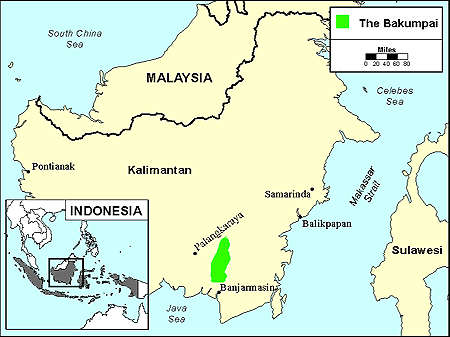|
|
Prayer Profile
The Bakumpai of Indonesia
![[IMAGE]](../images1/0231.jpg) The Bakumpai are one of the more than 300 distinct people groups living in Indonesia. The 51,000 Bakumpai live on the island of Borneo, which is located in Southeast Asia. Indonesia's 3,000 islands act as vital sea routes between Asia, Europe, and Australia. They are also the principle link between the Pacific and Indian Oceans.
The Bakumpai are one of the more than 300 distinct people groups living in Indonesia. The 51,000 Bakumpai live on the island of Borneo, which is located in Southeast Asia. Indonesia's 3,000 islands act as vital sea routes between Asia, Europe, and Australia. They are also the principle link between the Pacific and Indian Oceans.
Borneo is the third largest island in the world, and only the southern three-fourths belongs to Indonesia. This region is called "Kalimantan," and is about the same size as France.
The people of Kalimantan can be divided into four categories: the Malays, the Migrants, the Dayaks, and the Ot. The Bakumpai belong to the Dayaks. The term "Dayak" is actually a collective name for a large number of non- Muslim peoples. They live along the banks of a large river system where they grow rice and collect forest products such as resin, rubber, ironwood, and skins.
What are their lives like?
The largest group of Dayak in the central Kalimantan province are known as the "Ngadju." Their villages lie along the big rivers. Although the Bakumpai are part of the Ngadju speaking people, they are usually considered as a separate group. The Bakumpai appear to be descendants of the Ngadju Dayak, who adopted the Islamic religion and later intermarried with other Dayaks.
The main economic activity of the Bakumpai is the farming of dry rice and a few vegetables. Fishing is relatively important, while hunting (which is done with dogs and lances for wild pig; blowpipes for small game) is less important. Most are traders, rubber planters, and farmers. Their involvement in industrial arts includes plaiting and basketry (which are important trade items), iron working, pottery, weaving, canoe making, tattooing, and wood carving.
The Bakumpai receive family names and inheritances from both of their parents. Marriages usually take place within the same social unit, and are permitted with anyone except close relatives.
The Bakumpai tribe is divided into subtribes that inhabit a single village or part of a village. These villages have central community houses that are used for meetings and ceremonial festivals. Among the Bakumpai, extended families (up to four generations) often live together.
Many of the Dayak tribes have a history of headhunting. They also have a custom of killing slaves at death rites of chiefs. Bakumpai warriors usually wear protective, poncho-like cloaks of bark cloth, padded with "kapok" (silky fibers) or with overlapping bone plates.
What are their beliefs?
Most of the Bakumpai are animists (believe that non-living objects have spirits), and worship a supreme god of the upper world (who is male), and a god of the underworld (who is female). Numerous spirits, good and bad, acknowledge their own rajas, or lords. Priests and/or priestesses are known to speak in a "spirit language" when possessed by spirits. The priests perform funerals and specialize in long death chants which they believe will lead the soul of the deceased to the spirit world. Such rituals may also include strong sexual contact. People are buried in a wooden coffin for several years. Later, their remains are recovered and then deposited into a raised tomb or platform. Other funeral rites include long, elaborate meetings, animal sacrifices, smearing of participants in blood, lengthy chants, and the raising of large wooden memorial images.
What are their needs?
Prior to Europe's intervention, the Dayak were often exploited by other countries. Unfortunately, they lost much land as a result of harassment and headhunting raids. Today, the Dayak still have a "slave complex" as a result of their long history of exploitation.
There are several hundred Bakumpai believers, but they have very few Christian resources available to them. The Bible has not yet been translated into their native language.
Prayer Points
- Pray against the spirits of animism and Islam that have kept the Bakumpai bound for many generations.
- Ask the Lord to call people who are willing to go to Borneo and share Christ with the Bakumpai.
- Pray that the Bakumpai will grow weary of serving many gods and will begin searching for the Truth.
- Ask God to strengthen, encourage, and protect the small number of Bakumpai Christians.
- Pray that God will raise up qualified linguists to translate the Bible into the Bakumpai language.
- Ask the Holy Spirit to soften the hearts of the Bakumpai towards Christians so that they will be receptive to the Gospel.
- Pray that God will open the hearts of Indonesia's governmental leaders to the Gospel.
- Ask the Lord to raise up a strong local church among the Bakumpai.

Statistics
Latest estimates from the World Evangelization Research Center.
THE PEOPLE
- People name: Bakumpai
- Country: Indonesia
- Their language: Bakumpai
- Population:
- Largest religion:
- Christians: 1%
- Church members: 513
- Scriptures in their own language: None
- Jesus Film in their own language: None
- Christian broadcasts in their own language: None
- Mission agencies working among this people: None
- Persons who have heard the Gospel: 12,300 (24%)
- Persons who have never heard the Gospel: 39,000 (76%)
THEIR COUNTRY
- Country: Indonesia
- Population:
- Major peoples in size order:
- Major religions:
- Number of denominations: 113
© Copyright 1997
Bethany World Prayer Center
This profile may be copied and distributed without obtaining permission
as long as it is not altered, bound, published
or used for profit purposes.
![[HOME BUTTON]](../graphics/home.jpg)
![[CALENDAR BUTTON]](../graphics/calico.jpg)
![[LIST BUTTON]](../graphics/listico.jpg)
[Home]
[Calendar]
[Country List]
|